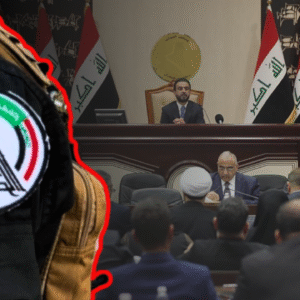These 3 AI Programs Are Fueling Israel’s War on Gaza

In Gaza, artificial intelligence has become one of Israel’s deadliest weapons—quietly transforming surveillance into targeted warfare. Three main AI programs developed by the IDF sponsor the ongoing occupation and ethnic cleansing of Palestinians.
Lavender, The Gospel, and Where’s Daddy? constitute the Zionist military’s evacuation monitoring tool, which relies on cell phone location data and cell tower triangulation to surveil Gazans.
Beside cyber-tracking, spyware programs integrated or hacked into mobile phones are a silent ally for the Zionist army. Tal Mimran, a lecturer at Hebrew University in Jerusalem and a former legal adviser in the IDF, has admitted the extent to which AI is now involved:
“During the period in which I served in the target room [between 2010 and 2015], you needed a team of around 20 intelligence officers to work for around 250 days to gather something between 200 to 250 targets. Today, the AI will do that in a week.”
Israeli AI in Gaza
Lavender detects suspicious individuals based on a “terrorist” identity or a link to militant groups. It assigns a numerical score to Gazan inhabitants, whose threshold is decided upon by IDF officers. Through semi-supervised machine learning, the program uses characteristics and patterns found in individuals with a link to “terrorist” groups and identifies them in additional suspects from the general population.
While international law necessitates the presumption of civilian status for identified individuals, this system presupposes the guilt of surveilled individuals. Such an assumption is based on characteristics that are often irrelevant to the possibility of criminal activity. This is while the Zionist threshold broadens the definition of “terrorist” to also include individuals associated with human rights organizations.
The Gospel generates lists of military sites, underground tunnels, family homes of suspected militants, and civilian structures. Its main purpose is to distinguish between civilian objects and non-human military targets. Despite that recognition, civilian structures in Gaza are still struck, revealing a deeper genocidal motivation and attempts at psychological warfare.
Where’s Daddy? is an extension of the last two methods. As its name suggests, it uses mobile phone location to track individuals who have been marked as military targets. IDF operators are notified when these targets enter specific locations. Targeting is facilitated through access to a mobile’s GPS data or by triangulating cell tower locations.
However, the location of a mobile phone is not a reliable indicator of a human target. Devices and numbers during war are always changing, as access to networks and devices frequently fluctuates. The limited accuracy of cell tower and GPS tracking also raises concerns about the risk of mitigating civilian harm.
It overlooks the presence of civilian non-targets, which the rules of war require to be considered, and shows little to no regard for humanitarian losses.
A Silent Spy
Cell phone data also advances IDF military objectives through invasive spyware technology. While its execution is concentrated within West Asia and North Africa, any device connected to the internet is not secure.
Samsung’s A and M smartphone series integrate a pre-installed application called AppCloud. AppCloud is owned by ironSource—an Israeli-founded company now owned by the American company Unity. It is incredibly difficult — almost impossible — to uninstall such bloatware, and a phone cannot be purchased without it.
Through the application, sensitive information, including personal details and IP addresses, becomes accessible. This can facilitate targeting specific individuals for assassination and accelerate cyber-intelligent data collection.
Another controversial software is Pegasus. Inaugurated by NSO Group, an Israeli cyber-intelligence firm, Pegasus provides access to a phone’s microphone, files, and camera.
Although invasive technology assists IDF objectives in Gaza and Lebanon, Pegasus has been internationally employed to hack mobile phones all around the world. It contributed to the assassination of journalist Jamal Khashoggi by Saudi authorities and was involved in several U.S. lawsuits against spyware.
Implications for Resistance Groups
Israeli spyware technology has undoubtedly been the orchestrator behind the assassinations of Hezbollah officials since September 2024.
As the Zionist entity advances its AI-driven neocolonial agenda, resistance groups often underestimate the power of technology—leaving themselves exposed, despite warnings from their leaders.
“The collaborator [with the Israelis] is the cell phone in your hands, and those of your wife and your children. This cell phone is the collaborator and the killer.”
— Sayyed Hasan Nasrallah, former secretary-general of Hezbollah
Today, technological progress is advancing faster than policy and legal frameworks can keep up. In this context, any efforts by anti-Zionist groups to develop or deploy AI countermeasures must be understood as acts of self-defense—necessary responses to the ongoing imperial aggression carried out by the Zionist regime and its allies.
Without meaningful reform or enforcement of international law, this digital arms race will continue to deepen the cycle of violence and oppression.
If you value our journalism…
TMJ News is committed to remaining an independent, reader-funded news platform. A small donation from our valuable readers like you keeps us running so that we can keep our reporting open to all! We’ve launched a fundraising campaign to raise the $10,000 we need to meet our publishing costs this year, and it’d mean the world to us if you’d make a monthly or one-time donation to help. If you value what we publish and agree that our world needs alternative voices like ours in the media, please give what you can today.










